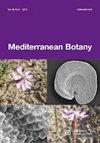巴勒斯坦被占领土的兰花(巴勒斯坦西岸)
IF 0.7
4区 生物学
Q3 PLANT SCIENCES
引用次数: 3
摘要
对被占领巴勒斯坦领土上兰花科(兰科)成员的文献数据和新记录进行了审查,并根据实地数据进行了更新。利用巴勒斯坦自然历史博物馆(PMNH)的数据、其他植物学家的数据以及生物多样性数据库(BioGIS和GBIF),用QGIS软件包分析了分布模式。初步研究共发现8属23个分类群。对于这两个物种,没有过去20年的最新数据,在某些情况下可能由于人类活动而减少。大多数物种来自地中海植物地理区,即白藜芦Hohen是在苏丹埃塞俄比亚地区(死海流域)发现的。发现的大多数物种更喜欢半开放的灌木林(加里格)。总共有9个物种的记录少于20个。从历史数据和当前空间数据中观察到的趋势揭示了主要威胁,包括栖息地破碎化、城市化、农业用地集约化、植树造林和全球变暖导致的降水减少。我们注意到,许多物种靠近多刺灌木,这表明在实地考察期间,放牧动物施加了压力。由于最近的数据很少,建议对过去曾遇到过稀有物种的地点进行调查,并讨论保护弱势种群的措施。本文章由计算机程序翻译,如有差异,请以英文原文为准。
Orchids of the Occupied Palestinian Territories (West Bank, Palestine)
Literature data and new records of members of the orchid family (Orchidaceae) in the Occupied Palestinian Territories were reviewed and updated with field data. Using data from the Palestine Museum of Natural History (PMNH), data from fellow botanists, and the Biodiversity databases (BioGIS and GBIF), the distribution patterns were analyzed with the QGIS package. Twenty-three taxa of eight genera were found in this preliminary study. For two species, no recent data from the last 20 years were available and in some cases likely declined due to human activity. Most species are from the Mediterranean phytogeographical zone, Epipactis veratrifolia Boiss. & Hohen was found in the Sudanian-Ethiopian zone (Dead Sea valley). The majority of the species found prefer semi-open shrublands (garrigue). Nine species had fewer than 20 records overall. Trends observed from the historical data, and current spatial data revealed major threats, including habitat fragmentation, urbanization, intensification of agricultural land use, afforestation and reduced precipitation due to global warming. We noted the proximity to thorny shrubs in many species indicating pressure by grazing animals during field visits. As recent data is scarce, surveys of sites where rare species have been encountered in the past are recommended, and measures to protect vulnerable populations are discussed.
求助全文
通过发布文献求助,成功后即可免费获取论文全文。
去求助
来源期刊

Mediterranean Botany
Agricultural and Biological Sciences-Plant Science
CiteScore
2.40
自引率
10.00%
发文量
30
审稿时长
12 weeks
期刊介绍:
Mediterranean Botany (ISSNe 2603-9109), formerly Lazaroa, is a biannual journal that publishes original research studies in the field of Botany including plant systematics, vegetation ecology, biogeography, evolutionary biology, ecophysiology, community ecology, ethnobotany and conservation biology on Mediterranean biomes but also in interacting areas.
Mediterranean Botany is an OPEN ACCESS Journal, free of charges for any published article.
 求助内容:
求助内容: 应助结果提醒方式:
应助结果提醒方式:


